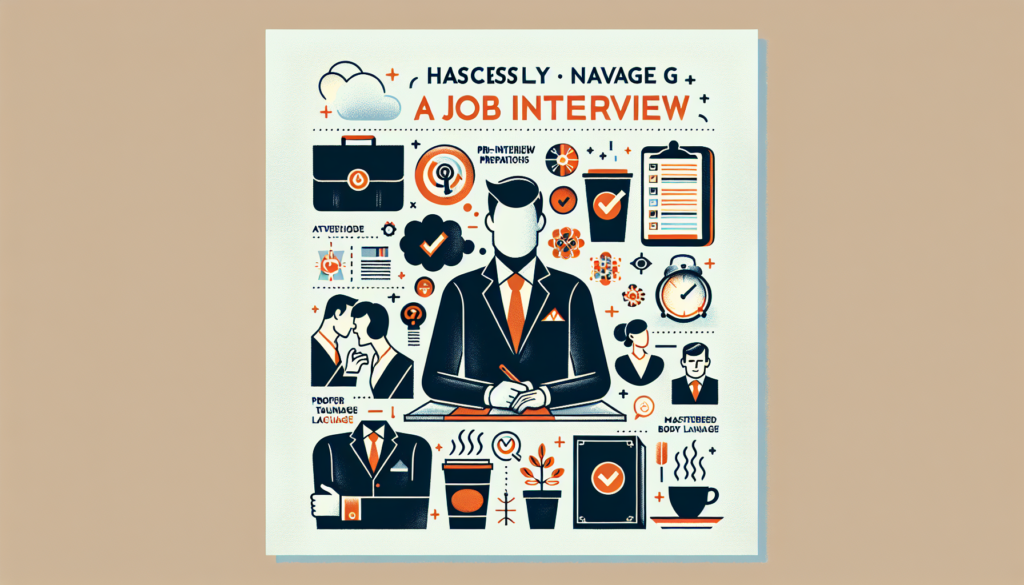Congratulations on scoring an interview for your dream job! We understand that job interviews can be nerve-wracking and overwhelming, but fear not, because we have got you covered. In this ultimate guide, we will share valuable tips and techniques to help you ace your next job interview. From preparing for common interview questions to mastering the art of body language, we will provide you with all the tools you need to confidently navigate through this crucial stage of your career journey. So, get ready to impress your potential employer and secure that dream job!

Research the Company
When preparing for a job interview, one of the most important steps is to research the company you will be interviewing with. Learning about the company’s history, mission, values, products, and recent news and updates can give you valuable insights into the organization and help you tailor your responses during the interview.
Learn about the Company’s History
Start by delving into the company’s history. Find out when it was founded, who the founders are, and how it has evolved over the years. This information will give you a better understanding of where the company came from and its journey to where it is today. Additionally, take note of any significant milestones, achievements, or challenges the company has faced along the way.
Study the Company’s Mission and Values
Understanding the mission and values of the company is crucial in demonstrating that you align with its goals and culture. Take the time to read through the company’s mission statement and explore its core values. Consider how these align with your own beliefs and aspirations. By showcasing your alignment with the company’s mission and values, you can demonstrate your genuine interest in working for the organization.
Research Recent News and Updates
Stay up-to-date with the latest happenings in the company. Explore recent news articles, press releases, and social media updates to gather information about any significant projects, expansions, or changes within the organization. This knowledge will not only demonstrate your interest and preparedness but also provide potential topics for discussion during the interview.
Know the Company’s Products or Services
Familiarize yourself with the products or services the company offers. Take the time to explore their website and learn about their offerings. Pay attention to their unique selling points, target audience, and any recent developments or innovations in their products or services. Having this knowledge will enable you to speak confidently about how your skills and experiences align with the company’s offerings.
Understand the Job Requirements
To impress the interviewer, you need a clear understanding of the job requirements. This involves thoroughly reading the job description, identifying key skills and qualifications, and researching the typical job responsibilities.
Thoroughly Read the Job Description
Start by carefully reading through the job description multiple times. Look for keywords and phrases that describe the desired qualifications and responsibilities of the role. Pay attention to both the required skills and the preferred qualifications. Understanding the job description thoroughly will allow you to tailor your answers during the interview to showcase how your experience and skills match the specific requirements of the position.
Identify the Key Skills and Qualifications
After analyzing the job description, identify the key skills and qualifications the employer is seeking. Make a list of these requirements and assess how your own skills and experiences match up. Highlight the skills that you possess and think about specific examples from your past experiences that demonstrate these skills. This will prepare you to provide concrete examples during the interview that showcase your abilities.
Research the Typical Job Responsibilities
In addition to the skills and qualifications, it’s essential to understand the typical job responsibilities associated with the role you are interviewing for. Research industry norms and speak with professionals working in similar positions to gain insights into what will be expected of you. This knowledge will enable you to speak intelligently about how your past experiences have prepared you for the specific job responsibilities.
Prepare Your Answers
Preparing your answers in advance is an effective way to boost your confidence and ensure you provide thoughtful, articulate responses during the interview. Take the time to anticipate common interview questions, practice answering behavioral questions, craft your responses using the STAR method, and prepare examples for your skills and achievements.
Anticipate Common Interview Questions
While you can never predict exactly which questions you will be asked, it is beneficial to anticipate and practice responses to common interview questions. Consider questions such as “Tell me about yourself,” “What are your strengths and weaknesses,” or “Why do you want to work for this company?” By preparing answers to these types of questions, you will be better equipped to provide concise and well-thought-out responses during the interview.
Practice Answering Behavioral Questions
Many interviews include behavioral questions that require you to provide examples of past experiences and how you handled specific situations. Take the time to brainstorm and practice answering these types of questions. Use the STAR method (Situation, Task, Action, Result) to structure your responses, ensuring you provide a clear and concise description of the situation, the task or problem you faced, the actions you took, and the positive results you achieved.
Craft Your Responses with STAR Method
The STAR method is a valuable framework for crafting well-structured and impactful responses during an interview. By using this method, you can provide a clear and concise breakdown of your experiences and achievements. Remember to emphasize the positive results or outcomes that demonstrate your skills and abilities.
Prepare Examples for Your Skills and Achievements
To showcase your abilities effectively, it is crucial to have specific examples ready for your skills and achievements. Think about past experiences where you demonstrated important skills such as leadership, problem-solving, teamwork, or adaptability. Be prepared to describe these experiences in detail, providing context, actions you took, and the outcomes you achieved. This will allow you to provide concrete evidence of your capabilities during the interview.
Dress Professionally
Your appearance plays a significant role in making a positive impression during a job interview. It is essential to choose appropriate attire, pay attention to grooming, and wear comfortable and polished shoes.
Choose Appropriate Attire
When deciding what to wear to your interview, it’s crucial to choose appropriate attire that aligns with the company’s culture and industry norms. Opt for formal or business professional attire unless the company specifically states otherwise. It’s better to be slightly overdressed than underdressed, as it shows respect for the interview process and reflects your professionalism.
Pay Attention to Grooming
In addition to your clothing, pay attention to your grooming. Make sure your hair is clean and neatly styled. Keep facial hair well-groomed and ensure your nails are clean and trimmed. Avoid wearing excessive cologne or perfume, as strong scents can be distracting or unpleasant for the interviewer.
Wear Comfortable and Polished Shoes
Choose a pair of comfortable and polished shoes that complement your outfit. Make sure they are clean and in good condition. If possible, opt for closed-toe shoes, as they are generally considered more professional. Keep in mind that you may be on your feet for extended periods during the interview, so prioritizing comfort is important.

Arrive Early and Be Punctual
Arriving early and being punctual are essential elements of making a positive impression during a job interview. Plan for transportation and directions, consider traffic and parking, and aim to arrive 10-15 minutes before the scheduled time.
Plan for Transportation and Directions
Before the day of your interview, plan your transportation method and familiarize yourself with the route to the interview location. If you are taking public transportation, check the schedules and allow extra time for possible delays. If you are driving, use GPS or a map application to estimate travel time and be prepared for traffic conditions.
Consider Traffic and Parking
Traffic can be unpredictable, so it’s crucial to factor in potential delays when planning your journey. Leave earlier than necessary to account for any unexpected situations on the road. Additionally, if you are driving, research parking options near the interview location in advance. Make sure you allow ample time to find parking and walk to the interview site.
Arrive 10-15 Minutes Before the Scheduled Time
Being punctual is essential, but arriving excessively early can also be inconvenient for the interviewer. Aim to arrive at least 10-15 minutes before the scheduled interview time. This will allow you to settle in, use the restroom if needed, and gather your thoughts before the interview. Avoid arriving too early, as it may disrupt the interviewer’s schedule and make you feel rushed or anxious.
Demonstrate Confidence and Body Language
Non-verbal communication plays a significant role in how you are perceived during a job interview. To make a positive impression, it is important to make eye contact, have a firm handshake, maintain good posture, and show enthusiasm through your smile and demeanor.
Make Eye Contact
Maintaining eye contact throughout the interview is crucial in demonstrating your engagement and confidence. It shows that you are actively listening and interested in the conversation. Be sure to look each interviewer in the eye while speaking or listening, but avoid staring intensely, as it may make the other person uncomfortable.
Have a Firm Handshake
A firm handshake conveys confidence and professionalism. Offer a firm handshake to each person you meet during the interview, including the initial greeting and when you leave. Practice your handshake beforehand to ensure it is neither too weak nor too forceful. Remember to smile and make a brief connection with the other person while shaking hands.
Maintain Good Posture
Your posture can influence how you are perceived during an interview. Sit up straight and maintain good posture throughout the conversation. Avoid slouching or leaning back in your chair, as it may convey disinterest or a lack of enthusiasm. By sitting tall and keeping your shoulders back, you will project confidence and attentiveness.
Smile and Show Enthusiasm
Smiling and showing enthusiasm can help create a positive and memorable impression. From the moment you walk into the interview room, greet the interviewer with a warm smile and a friendly demeanor. Throughout the conversation, actively engage, listen attentively, and respond with enthusiasm. Let your passion for the role and the company shine through your words and expressions.

Prepare Questions for the Interviewer
Asking thoughtful questions during an interview not only demonstrates your interest but also allows you to gather valuable information to assess whether the company and the role are the right fit for you. Prepare questions about the company culture, opportunities for growth, and the job duties and expectations.
Ask About the Company Culture
Inquire about the company culture to gain insights into the work environment and the values that drive the organization. Ask questions such as “How would you describe the company culture?” or “What is the management style within the organization?” This will help you assess whether the company’s values align with your own and determine if it is a place where you can thrive.
Inquire about Opportunities for Growth
Demonstrate your ambition and long-term commitment by asking about opportunities for growth within the company. Discover the potential career paths and development programs available. Ask questions like “What opportunities are there for professional growth and advancement in this role?” This will show your enthusiasm for personal and professional development and your desire to contribute to the company’s success in the long run.
Ask for Details about the Job Duties and Expectations
To gain a clearer understanding of what will be expected of you in the role, ask specific questions about the job duties and expectations. Seek clarification on any points that may not have been covered adequately in the job description. For example, you could ask, “Could you please provide more details about the day-to-day responsibilities of this role?” or “What are the top priorities for this position in the first few months?” This will demonstrate your commitment to fully understanding the requirements of the role.
Bring Necessary Documents and Materials
To ensure a smooth interview experience, it is important to bring necessary documents and materials. Make sure to print extra copies of your resume, prepare a list of references, and bring a notepad and pen for taking notes.
Print Extra Copies of Your Resume
Although the interviewer may have access to your resume, it is essential to bring extra printed copies. This allows you to offer them to any additional interviewers who may join the conversation unexpectedly or to refer to specific details during the interview. Ensure that the copies are clean, neatly arranged, and printed on high-quality paper.
Prepare a List of References
Prepare a list of professional references that you can provide if requested. Include the names, titles, contact information, and a brief description of your relationship with each reference. Make sure to inform your references in advance that they may be contacted, so they are prepared to speak positively about your skills and experiences.
Bring a Notepad and Pen for Taking Notes
Bringing a notepad and pen allows you to take notes during the interview. Jot down important information, key points, or questions that arise throughout the conversation. This demonstrates your attentiveness and helps you remember important details for follow-up or future reference. Avoid excessive note-taking, as it may distract from the conversation.

Follow-Up After the Interview
After the interview, it is essential to follow up with a thank-you email or letter. Express your continued interest in the position, and inquire about the next steps in the process.
Send a Thank-You Email or Letter
Within 24 hours of the interview, send a personalized thank-you email or letter to each interviewer. Express your appreciation for the opportunity to interview and thank them for their time and consideration. Highlight specific aspects of the interview that resonated with you or that you found particularly interesting. This gesture demonstrates your professionalism and leaves a positive lasting impression.
Express Your Continued Interest
In your thank-you email or letter, reiterate your interest and enthusiasm for the position and the company. Mention specific reasons why you believe you would be a great fit and how your skills and experiences align with the job requirements. This reminds the interviewer of your qualifications and reinforces your commitment to the opportunity.
Ask about the Next Steps
Inquire about the next steps in the hiring process to gain clarity on the timeline and what to expect. Ask questions such as “When can I expect to hear back about the hiring decision?” or “Is there any additional information or documentation you need from me?” This demonstrates your proactive approach and helps you manage your expectations regarding the hiring process.
Practice Mock Interviews
To enhance your interview skills, consider engaging in mock interviews with a mentor, career coach, or trusted friend. Get feedback on your performance, record and assess your responses, and practice answering interview questions aloud.
Get Feedback from a Mentor or Career Coach
Seek feedback from a mentor or career coach who can provide valuable insights into your interview performance. Practice mock interviews with them and ask for their constructive feedback on your answers, body language, and overall presentation. Take their feedback seriously and use it to identify areas for improvement.
Record and Assess Your Performance
Consider recording your mock interviews to assess your performance objectively. Pay attention to your body language, tone of voice, and clarity of your responses. Identify areas where you can improve, such as eliminating filler words, refining your storytelling, or strengthening your delivery. This self-assessment will enable you to refine your interview skills and become more confident in your abilities.
Practice Answering Interview Questions Aloud
To become comfortable with interviewing, practice answering interview questions aloud. This will help you clarify your thoughts and articulate your responses more effectively. Consider practicing in front of a mirror to observe your body language and expressions. The more you practice, the more natural and confident you will become in the actual interview.
In conclusion, acing your next job interview requires thorough preparation and careful attention to detail. By researching the company, understanding the job requirements, preparing your answers, dressing professionally, arriving early, demonstrating confidence and body language, preparing questions for the interviewer, bringing necessary documents and materials, following up after the interview, and practicing mock interviews, you can greatly increase your chances of success. Remember to stay calm, be yourself, and let your authentic qualities shine through. Good luck with your next job interview!
